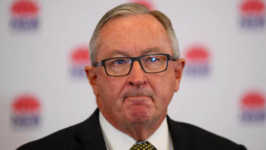NSW Regional Health Crisis: Emergency Rooms Without Doctors, Cooks Caring for Patients, Systemic Misdiagnoses and Critical Errors

Cooks looking after patients and emergency departments without doctors – this is the current state of parts of the New South Wales Regional Health System, according to a recent parliamentary inquiry.
In its final report, the inquiry uncovered woeful inadequacies in the system, finding that health services are both “inferior” to those found in the cities and major metropolitan areas, and riddled with “historic failures.”
Unacceptable state of affairs
The inquiry spanned more that a year and involved over a dozen hearings into various aspects of regional health.
The review committee’s chairperson, New South Wales Legislative Council Member Greg Donnelly, remarked that the current state of the system is “a situation that should not be seen as acceptable.”
The review committee heard stories of emergency departments without doctors; patients being cared for by cooks and cleaners; excessive waiting times, systemic misdiagnoses and critical medical errors.
Quick to point out that this was in no way a reflection of the health staff – who work tirelessly in exceptionally challenging circumstances – Mr Donnelly found it deplorable that the situation had been allowed to develop and fester for so long, urging the NSW Government to adopt all 44 recommendations made in the committee’s report.
The committee found that residents of rural, regional and remote New South Wales have poorer health outcomes and inferior access to health and hospital services than their metropolitan counterparts, as well as face significant financial challenges in accessing basic services.
It also found that NSW Health had a “culture of fear” which gagged staff, preventing them from raising concerns about patient safety, staff welfare and the lack of resources.
NSW Health Minister – fostering a culture of fear
One of the committee’s recommendations is to give NSW Regional Health Minister, Bronnie Taylor, a revamped system to work with, and provide her with more autonomy in decision-making. She currently reports NSW Health Minister Brad Hazzard.
Th pair’s relationship has been fraught at times, with accounts earlier this year that Health Minister Hazzard launched an unwarranted verbal onslaught against Ms Taylor during a meeting about Covid-19 restrictions.
A number of the Ministers in attendance at that meeting were so concerned about what was described as an “humiliating” attack that they contacted Ms Taylor after the meeting. Ms Taylor subsequently complained to the Premier Domenic Perrorret who ‘counselled’ Mr Hazzard.
The incident involving Ms Taylor occurred just weeks after Mr Hazzard had been called out on social media for his disdainful treatment of a female journalist at a press conference.
Claims that Mr Hazzard has less tolerance for females than he appears to have for males have followed Mr Hazzard for some time, leading many to question why he still retains such an important portfolio in New South Wales.
Culture of secrecy
As we all know, much of Australia’s politics occurs behind ‘closed doors’ without full disclosure and transparency at the best of times.
To a large degree, given that media doesn’t always have access to ALL of the information, we are expected to ‘blindly trust’ those we elect into power, and yet many behave disrespectfully towards one another, turn a blind eye to the rules when it suits them, and make decisions that aren’t always in the best interest of the public or let political point scoring get in the way of teamwork and cooperation. Worse, many are never held accountable for such behaviour.
It’s really not a surprise that NSW Regional Health is in crisis. It has been vastly underfunded for many years — as has the ‘whole’ of New South Wales Health for that matter.
This was made plain to us all during Covid-19 lockdowns which we were told were necessary to avoid everyone getting sick at the same time and overloading the system.
At the time, a sensible public accepted this as what had to be done – it was a social duty at an unprecedented time in history. We lost almost two years of personal freedoms under draconian rules.
Thousands of people were fined heavily for not complying with public health orders. Thousands lost jobs or had their incomes dramatically cut. People suffered emotionally and socially. The economy is still under repair.
When the pandemic hit, part of the Government’s responsibility was to shore up the health system, which it failed to do.
Doctors threatened with disciplinary action for expressing their opinions
Doctors faced the threat of disciplinary action for providing ‘false or deceptive’ advice or information that could undermine the national vaccination program.
Furthermore, vaccination mandates imposed on the healthcare sector forced a significant number of nurses and other employees to walk away from their jobs, at a time when they were needed most. Those nurses who stayed on, were ‘rewarded’ with a paltry 1.04% pay increase in August last year.
To say trust in the NSW Government’s ability to fix any of the significant number of social problems plaguing the state is pretty low right now, is an understatement.
Only the passage of time will tell whether this latest report gets filed away like so many others tend to do… or whether it actually becomes a catalyst for real change that ensures not just equitable access to health services for the general public, but much better working conditions for all healthcare workers too.







